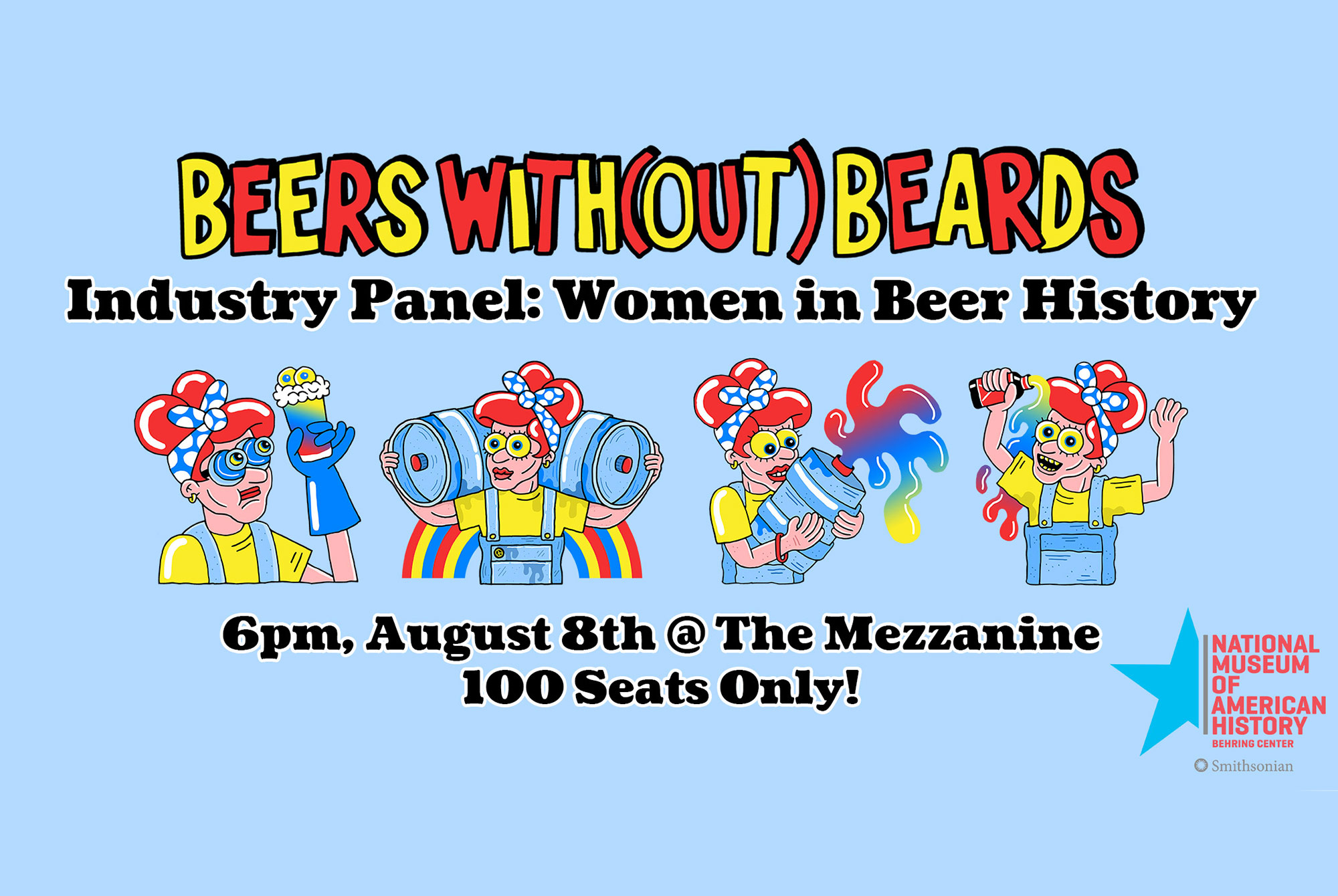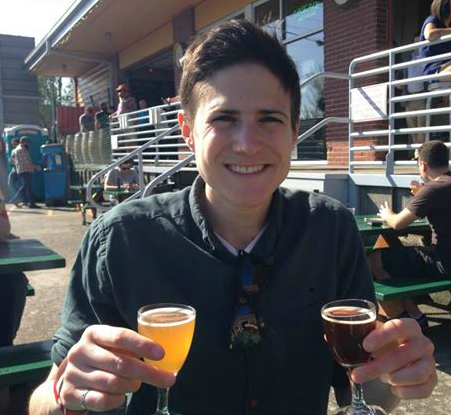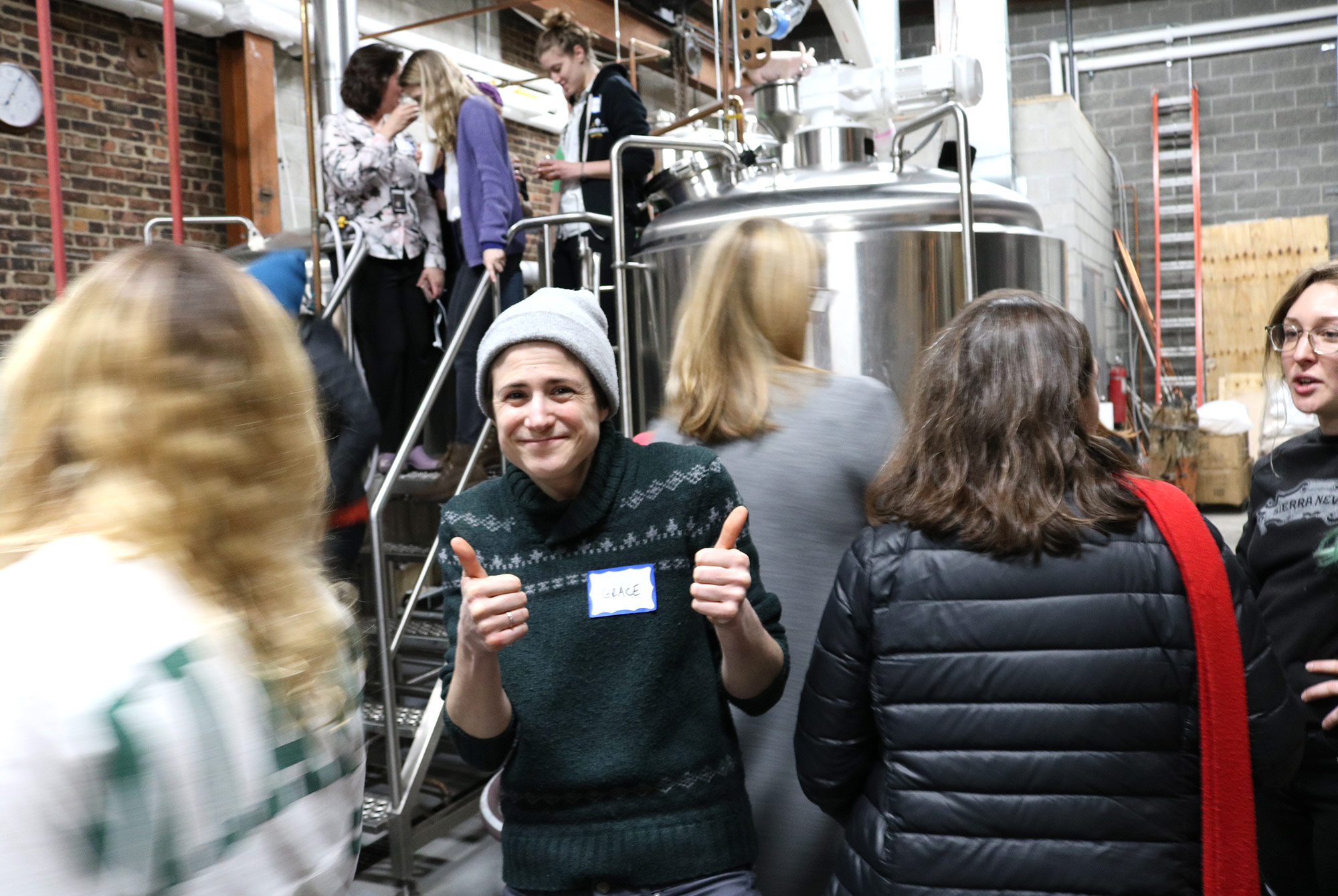Shop
How Women Ran the Beer Industry for Thousands of Years
Join us for a conversation about the history of women in beer.
Interested in learning more about the women in beer history? Join us August 8 from 6:00 to 9:00 PM at the Mezzanine for a panel on beer history led by Theresa McCulla, the first female historian of the American Brewing History Initiative at the Smithsonian’s National Museum of American History. Click here for tickets and more info.
She appears to be floating on a bubbling, undulating golden river. With long tendrils of red hair billowing behind her crowned head, she stands tall, proud, and ornate. A stalk of wheat tucked under one arm explodes exuberantly into the air while a basket of hops rests casually between her left hip and the crook of her wrist. As she pours a pitcher of amber liquid into the stream beneath her, Ninkasi, the Sumerian goddess of beer, seems to mimic the modern day Statue of Liberty–regally honoring the ingredients of her craft. This ancient depiction of the roots of beermaking does not portray a man, but rather a woman.
Why?
Because women were the OG brewers!
Dating as far back as 4000BC, Sumerian women were found on Mesopotamian cuneiform tablets brewing beer.
I learned this fact while taking a class called the History of Beverages in my graduate food studies program at New York University last December – about the same time that I started planning Hop Culture’s Beers With(out) Beards, a weeklong celebration of women in craft beer. With the rich knowledge of women’s history in beer fresh on my mind, I knew that I wanted to dedicate one night of our week to a curated panel of history.
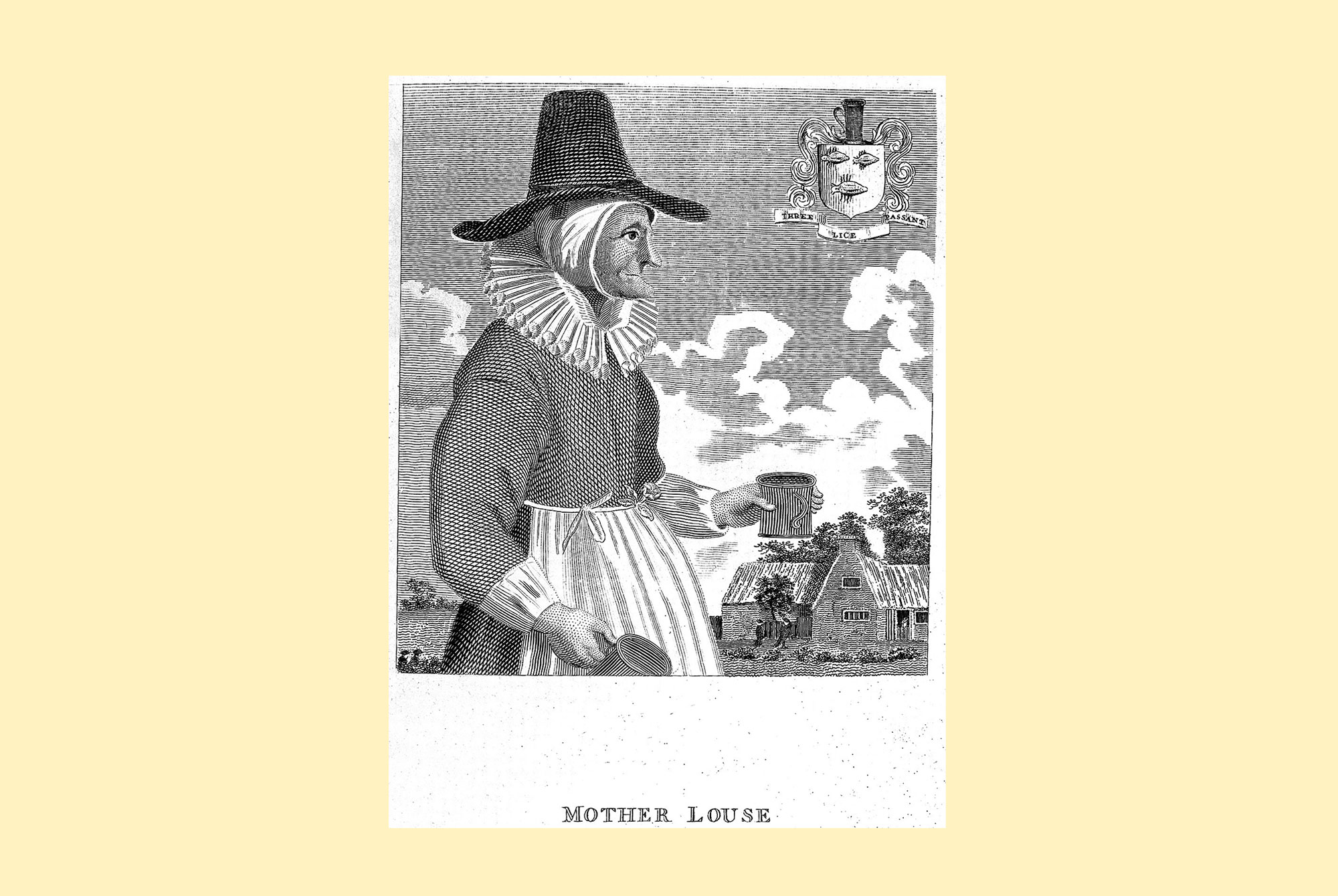
First, let me condense thousands of years of women in beer into a short, simple timeline.
A snapshot from my History of Beverages seminar (thankfully I take good notes):
- 4000BC – The first evidence of Sumerian women making beer is found on Mesopotamian cuneiform tablets.
- 2000BC – Evidence of Egyptian women making beer. The Egyptian goddess Hathor, the inventress of brewing and mistress of intoxication, is one of the first known goddesses of beer.
- 600-1000AD – It is common in the Wari empire of Peru for women to make chicha, a fermented corn brew.
- 1400AD – By this year women in London made up 30% of the brewers’ guild. Called Ale Wives or Brewsters, these women owned taverns and brewed beer.
- 1500-1600AD – As witchcraft became a great public concern women’s role in beer was seen as “bewitched” and by the late 1700-1800s the word brewster had all but disappeared and with it, women drinking and working with beer.
Fast forward to today: The demographics tell a different story.
The Brewers Association recently released a report citing among craft beer drinkers 31.5 percent are women and 68.5 percent are men. While the scales are recognizably unbalanced, the number of female craft beer drinkers has actually jumped up 2 percent from 2015. In three years craft beer has added 14.7 million new drinkers of which 6.6 million were women. That’s not quite 50/50, but it’s a start. Taking these statistics even further based on these 2017 Gallup poll results, if we had as many women drinking beer compared to men we’d have 35 million more beer lovers in the U.S.
Wow.
Just think about that number for a second: 35 million.
When Hop Culture started devising Beers With(out) Beards we developed two goals:
- To recognize the kickass achievements of the badass women in all roles of our industry.
- To tangibly alter the scaALEs of women both drinking and working in craft beer. Imagine if our festival could help add 35 million more craft beer lovers into our family!?
Of course, that’s a lofty goal, but with this festival, we’ve aimed high.
But before we look ahead to the future, we have to take a moment to glance behind us into the past, to learn from the women who have tirelessly brewed before us, and to comprehend how women went from the OG brewers to the minority in craft beer.
To grapple with the often complex and vast history of women brewing beer we invited five talented women, who have dedicated their lives to the study of women in beer, to lead our discussion: The Role of Women in Beer History. Anchored by Theresa McCulla, the first female historian of the American Brewing History Initiative at the Smithsonian’s National Museum of American History, our industry panel will lead us back in time to learn about the original women brewers.
“Trained as a historian of gender, race, and ethnicity, I place special emphasis on collecting the stories of women and people of color as I build the Smithsonian’s brewing history archive,” wrote Theresa in a guest post for Hop Culture. “These groups have always been at the center of American beer; women, especially enslaved women, were America’s first brewers. Yet statistics show that far fewer women and people of color make and drink beer now, compared to white men. There are historical reasons for why that has come to be.”
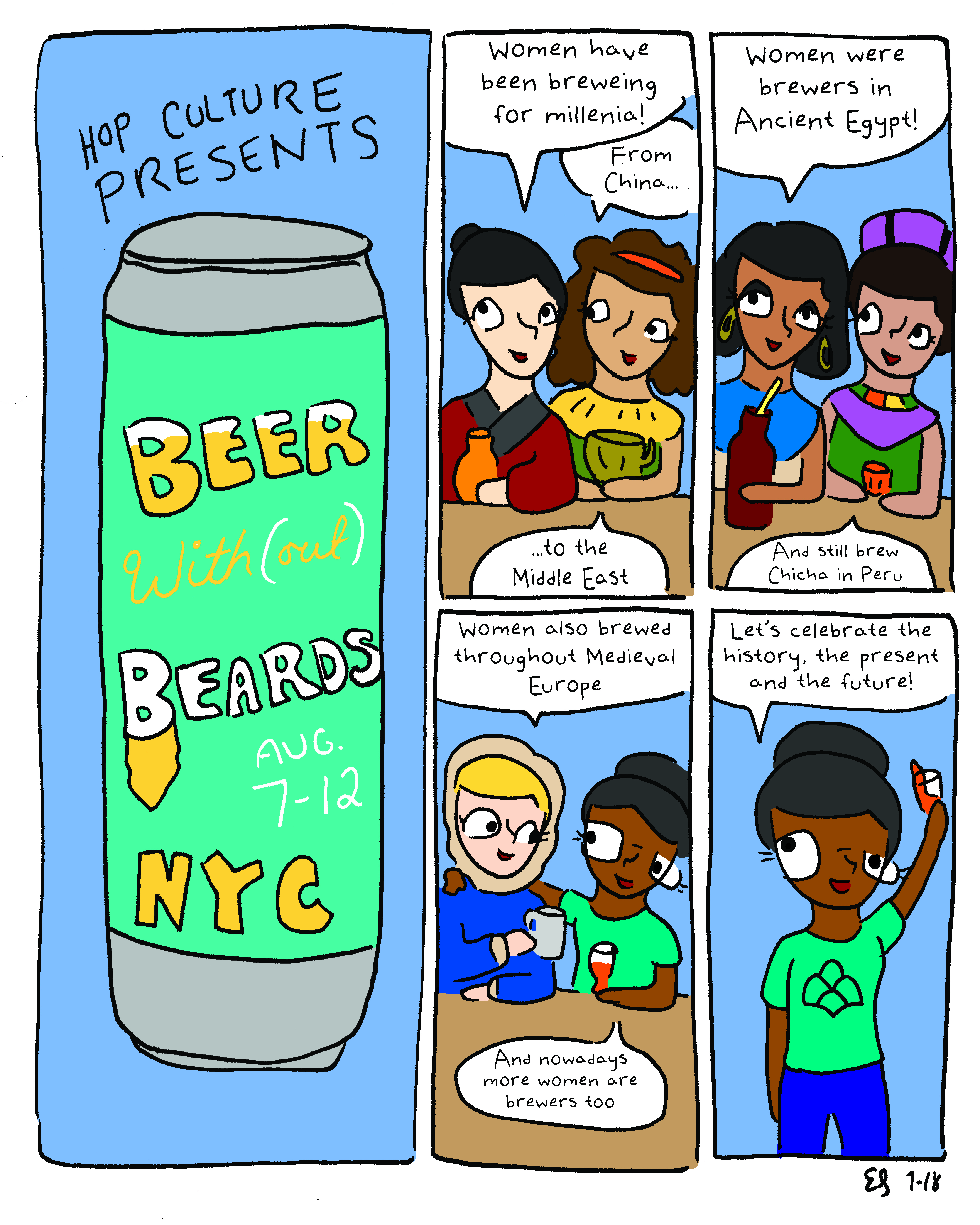
Artwork by Em Sauter
We will strive to answer these important questions as we uncover the facts from panelists like food historian and entrepreneur, Tonya Hopkins, who is currently researching African beer-making traditions for newly-opened craft beer bar Harlem Hops, and NYU History of Beverages instructor Diana Pittet.
“Alcohol has numerous dualities that make it complicated for society to negotiate and women often get cut out,” said Pittet. “This is a chance to talk about a forgotten history of women’s long connection with making beer.”
Pink Boots Historian and panelist, Tara Nurin, agrees, “It’s insane to me how you take any single period and any single place and it’s the same story over and over and over again: Religion, capitalism, and royalty always pushed women out of the brewhouse.”
The struggle for women in beer has made discussions like ours tantamount to balancing the scales.
“The role of women in the history of beer is paramount. There wouldn’t be a beer industry without women and its important to me that people know, understand, and appreciate that [fact],” said Nurin. “We’re in a culture right now where we’re not used to associating women with beer. I’m so thrilled to be on a panel with the other panelists because these are some of the top knowledgeable women in the industry, and I can’t wait to hear what they have to say.”
As our panelists deftly navigate the details of when and how women disappeared from beer we’ll also journey to the 21st century to listen to the experiences of present-day pioneers like Carol Stoudt, the first female brewmaster in the U.S. since prohibition and founder of Stoudts Brewing Co. in Lancaster PA.
“This will be the first time I have the opportunity to speak at an event focused solely on the role of women in American brewing history,” said McCulla. “That’s exciting and overdue. Also, I’m thrilled by the range of expertise that will be represented on stage: from the ancient era to the present (and future) of beer. The speakers have honed their expertise in the brewery, the archives, the classroom, and at the point of sale. These women do it all.”
With the caliber of women traveling from far and wide to participate, this panel will be a cornerstone event for Beers With(out) Beards. From the Sumerians and Egyptian women who started it all to the badass women brewers who will be pouring beer with us all week long I’m excited and proud to present a night simultaneously dedicated to our roots and to pushing women in craft beer forward into the future.
Liked this article? Sign up for our newsletter to get the best craft beer writing on the web delivered straight to your inbox.

